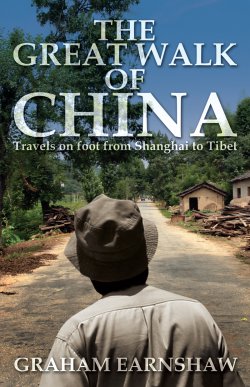Book Review: The Great Walk of China

****
Graham Earnshaw’s 30 year tenure in China as a journalist, businessman and, most recently, publishing magnate, have made him a permanent fixture in the Shanghai scene – which is exactly why Earnshaw makes it a point of de-fixing himself at least once a month to walk in the countryside and “speak to the Real China”.
It is an ongoing journey that he has tasked himself with completing since 2004, and though not continuous, Earnshaw has thus far traversed over three per cent of the earth's circumference between Shanghai and Tibet. On foot!
The Great Walk of China, Earnshaw’s published travelogue, is an account of just a fraction of his odyssey, covering the interior provinces of Anhui, Hubei, Chongqing and Sichuan. The walk is a straight line due west through some of China’s most rural regions, which is exactly the serene backdrop Earnshaw, fluent in Putonghua, prefers in a concerted effort to talk to as many people as possible.
From the spontaneous hospitality of peasants whom have never before seen a foreigner in the flesh to the reactions of low-level authorities who simply cannot grasp what he is doing venturing into the countryside, Earnshaw manages to interact with just about every class of citizen imaginable.
Earnshaw also illustrates the ironies of modern China’s identification crisis. He talks to villagers who exclaim “we are poor” out of habit, despite clutching state-of-the-art mobile phones, and students, many the first in their family to be literate yet completely devoid of ambition, who vapidly waste their days away in front of televisions.
Often, the farmers he encounters hope Earnshaw is a reporter out to expose corruption in the countryside, while officials are worried that this is exactly his motive.
“Are you corrupt?” Earnshaw toyingly asks one cadre. “Me, corrupt? No…well…I’m not in a position to be...” A shopkeeper eavesdropping on their dialogue suddenly howls in delight: “So it’s not that you don’t want to be corrupt, ha ha ha!!!”
Englishman Earnshaw deftly manages some clever responses to his frequent confrontations with backwoods police, all the while maintaining a pleasant (and at times romanticized and overly-optimistic) perspective that distinguishes The Great Walk.
Our narrator is, unfortunately, reluctant to share much personal insight into Graham Earnshaw the person, and keeps his writings strictly about the Chinese. In between chatting with the proletariat, Earnshaw pauses to comment on old propaganda slogans still found on countryside walls and muse on tiny animals crossing busy roads – a metaphor, perhaps, for the people of China’s struggle to catch up with their nation’s rapid progress.
Review by Tom Carter, the author of CHINA: Portrait of a People

